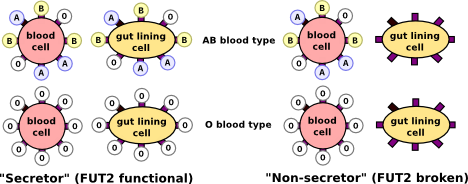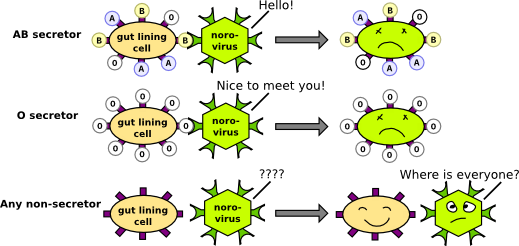The other day someone I work with closely called in sick (or rather, "emailed in") with a case of stomach flu, and expressed a hope that I was not infected. I was fine ... in fact ... I don't recall ever having a stomach flu. A colleague in David Reich's lab had mentioned that resistance to stomach flu is fairly common, and is tested by 23andme. Do I have this resistance? I checked, and I do! What's the causal variation? How does it work?
The genetic variation that makes me resistant is actually related to the ABO blood group system. ABO blood groups are a set of modifications made to the proteins that coat our red blood cells. The default modification is "O", while people with A or B genes can also have "A" and "B" modifications. In most people these modifications are also expressed on the surface of other cell types, including cells that line our gut and mouth.
Two genes are involved in placing the modifications on different cell types: FUT1 for red blood cells, and FUT2 for other cells ("mucosal tissues" and saliva). There is a common genetic variant that breaks the gene FUT2 by creating a stop codon (variously identified as rs601338, FUT2-W143X, and FUT2-W154X). 20% of Europeans and Africans have this highly disruptive variation on both copies of the gene (from both mom and dad). These people are "non-secretors": the ABO modifications don't occur on the surface of cells in their gut tissue.
[caption id="attachment_232" align="aligncenter" width="468" caption="ABO blood types involve modifications made to proteins that coat the surface of blood cells. Usually these modifications also appear on other cell types (including cells lining the gut and stomach) -- but 20% of Africans and Europeans are "non-secretors", due to a variant breaking the gene FUT2. (Image created by Madeleine Price Ball, shared under CC-BY-SA.)"] [/caption]
[/caption]
Most cases of stomach flu are caused by strains of "norovirus" (formerly called "Norwalk virus", often seen in cruise ship outbreaks). For norovirus to infect you, it needs to invade your cells -- and to do this, it needs to detect and attach to the cell's surface. Most noroviruses attach to the ABO modifications on the surface of gut tissue cells, using this to invade. Viruses generally recognize all three types pretty well (A, B, or O...although there's some reports of biases) ... more importantly, if none of these are present the virus can't invade! Non-secretors are extremely resistant to most strains of norovirus.
[caption id="attachment_211" align="aligncenter" width="519" caption="Secretors express their ABO blood group modifications on the surface of gut tissue cells. Norovirus uses these to recognize and enter the cells. As a result, non-secretors (who don't have these modifications in gut tissue) are extremely resistant to the virus -- the virus can't find the cell, and thus can't infect it. (Image created by Madeleine Price Ball, shared under CC-BY-SA.)"] [/caption]
[/caption]
There are still some strains of norovirus that will get me sick, so while I can say that I am "norovirus resistant", I would be stretching it to say I'm "invulnerable". These strains have evolved to recognize something different, instead of ABO modifications. That said, it's certainly a a nice trait to have, and one most people who have it wouldn't realize -- how many of us notice not getting sick?
Although a mutation destroying a gene is usually a bad thing, in this case it's beneficial -- it's actually a variant that protects against disease. As part of our automatic interpretations of genomes I've added a review of this variant to GET-Evidence, our public database of variant interpretations. It now shows up on genome reports; so far I can see that two members of the PGP-10 (PGP6 and PGP7) share this secret superpower with me.